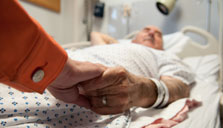 I didn’t pay much attention to them at first. The news stories about Wuhan and the Facebook posts from Christians there asking for prayer. I probably said a few ‘arrow prayers’ but didn’t really engage. It was all far away, and it wouldn’t ever impact us. I’m sorry, Lord. I’m challenged to widen my circle of concern and engagement.
I didn’t pay much attention to them at first. The news stories about Wuhan and the Facebook posts from Christians there asking for prayer. I probably said a few ‘arrow prayers’ but didn’t really engage. It was all far away, and it wouldn’t ever impact us. I’m sorry, Lord. I’m challenged to widen my circle of concern and engagement.
COVID-19 is now here. Changes we have been discussing around our ways of working get a kick-start as staff move out of buildings and embrace digital communications technology. Skype and PPE intrude on working days. I dislike both of them. The very thing that brought me into hospice care is the human contact. Presence, proximity and touch are fundamental to palliative care. They are also my ministry, given the stringent prohibitions around sharing faith in a healthcare setting.
It’s not the same caring for the dying from behind the barriers of mask and gloves.
I read of the experience of Italian colleagues who found that palliative care had to be ‘brutally’ adapted. Early on in our own experience, it has been the restrictions on visiting that have injured most, both families and staff. Seemingly inhumane and rapidly changing guidance, in the name of safety.
For a while, common sense in applying the guidance went out of the window, a testimony to the prevalent fear. Thankfully, pragmatism and compassion in caring for those at the end of life once again prevail.
I sense the fear all around. I sense it amongst some of our staff. I even sense it initially in the posts from Christians in my Facebook newsfeed. Come on, Church! We of all people should be hope carriers.
Society’s new mantra is, ‘be safe’. Precautions are necessary, but what are such messages doing to the collective psyche in a culture that already idolises safety? As believers, personal safety should be low on our list of priorities. I reflect on the early Christians who stayed behind in Carthage and other cities across the Roman Empire to care for plague victims and the evangelistic fruit of their service and sacrifice. I listen with excitement to the testimonies from believers working on COVID wards.
Stories from London start to mirror those from Italy, and we begin to take the possible impact on our region seriously. There is talk of a local Nightingale Hospital. This is a defining hour. Inwardly, I sense that it isn’t going to be as bad here as they are predicting. We are not London. I tell colleagues that based on prophetic conviction rather than science. But I prepare for the worst and trust for the best. And we need to support the wider healthcare community in this crisis or else the credibility of hospices may be in doubt.
We adapt our community and hospital support, and we temporarily increase the number of our beds (all with precious piped oxygen). We offer to help out with the Nightingale. The option of us taking COVID patients comes to the table.
I meditate for several days on worship and sacrifice. I am genuinely not afraid for myself. I dwell in Psalm 91, reciting it aloud every morning when I arrive on the ward, declaring its truths over the hospice, staff and city. My being there will make a difference, as will the handful of other believers in the clinical team. I carry the presence of God. But I am burdened by the possibility of losing one of my nursing or medical colleagues. It seems a reasonable sacrifice to lay down one’s life while trying to save others. But almost all of our patients are already dying. Laying down one’s life to enable them to have a better experience? If I died as a direct result of my work, wouldn’t that be a terrible waste? But a life poured out in service and worship of Jesus is never a waste – the alabaster flask attests to that. The kingdom isn’t utilitarian.
I recommend that we isolate part of the hospice to take patients dying with or from COVID. It is the right thing to do, but it will put staff in harm’s way. I tell my team that I will personally attend any COVID patients admitted to the unit, even if it means coming in when I am not meant to be at work. Their response is humbling and inspiring. They won’t hear of it. In fact, they will preferentially protect me, as my age puts me at higher risk.
The kindness of strangers is all around us in this crisis. It makes me believe that great blessing will come out of it. That and of course, the certain knowledge that God works all things for good to those who love him (Romans 8:28).
Three weeks later, it feels like a bit of a ‘phoney war’. There have been cases in the city, and some deaths and the heart-breaking stories surrounding those. But the expected surge hasn’t happened here. It was going to be Easter, then predicted mid-May, now possibly the autumn or winter. We have hundreds of empty hospital beds. And we’ve only just had our first COVID patient in the hospice. We wait. And pray. And trust
Because you have made the Lord, who is my refuge, even the Most High, your dwelling place, no evil shall befall you, nor shall any plague come near your dwelling; for he shall give his angels charge over you, to keep you in all your ways. (Psalm 91:9-11 NKJV)
Dr Jeff Stephenson is a consultant in palliative medicine at a Southwest England hospice



